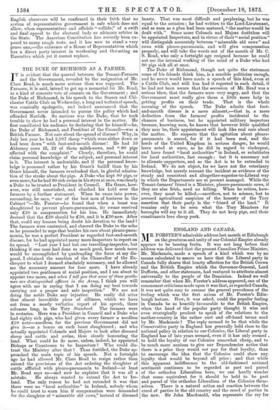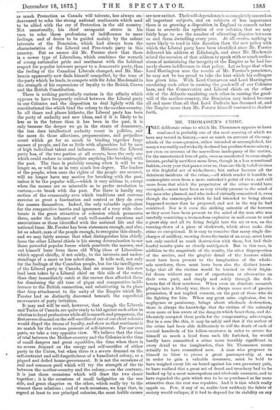ENGLAND AND CANADA.
MR. FORSTER'S admirable address last month at Edinburgh on the greatness and unity of our Colonial Empire already appears to be bearing fruits. It was not long before that address was delivered that the present Canadian Prime Minister, Mr. Mackenzie, made a speech of a kind which was by no means calculated to assure us here that the Liberal party in Canada fully shares that hearty affection for the British Crown and the British Empire which the Governor-General, Lord Dufferin, and other statesmen, had ventured to attribute almost universally to the people of the Dominion. Indeed we well remember that when Mr. Forster's address appeared, one of the commonest criticisms made upon it was that, as regarded Canada, it was not quite easy to assume the general prevalence of the feeling which was the first axiom of Mr. Forster's Edin- burgh lecture. How, it was asked, could the popular feeling in Canada be so heartily favourable to the British Empire, when the head of the popular party thought it wise and even strategically prudent to speak of the relations to the mother-country in the rather curt and off-hand terms used by Mr. Mackenzie The reply seemed to be that while the Conservative party in England has generally held close to the national policy in relation to our Colonies, the Liberal party in England has of late years seemed, even if it has only seemed , to hold the loyalty of our Colonies somewhat cheap, and to be much more anxious to give our Dependencies notice that there is a price they would not pay for that loyalty, than to encourage the idea that the Colonies could show any loyalty that would be beyond all price ; and that while this apparent indifference to the old-fashioned national sentiment continues to be regarded as part and parcel of the orthodox Liberalism here, we can hardly wonder that some equivalent for it should be held to be part and parcel of the orthodox Liberalism of the Colonies them- selves. There is a natural action and reaction between the creed of parties in the old country and the creed of parties in the new. Sir John Macdonald, who represents the cry for
as much Protection as Canada will tolerate, has always en- deavoured to echo the strong national sentiments which used to be allied with the cry of Protection in the old country. Not unnaturally, his chief antagonist strove in his turn to echo those professions of indifference to mere feelings, and of desire to be guided mainly by the salient interests of the Dominion, which had always been the characteristics of the Liberal and Free-trade party in this country. But no sooner did Mr. Forster show that there is a newer type of Liberalism, which combines the warmth of strong nationalist pride and sentiment with the habitual respect for popular interests proper to a democratic party, than the feeling of the Canadian Liberals changed, and Mr. Mac- kenzie apparently now finds himself compelled, by the tone of the party which he leads, to compete with Sir John Macdonald in the strength of his expressions of loyalty to the British Crown and the British Constitution.
There is nothing particularly curious in the affinity which appears to have frequently existed between the Liberal party in our Colonies and the disposition to deal lightly with the constitutional ties which bind the colony to the mother-country. In all times and places hitherto, the Liberal party has been the party of audacity and new ideas, and if it is likely to be less so in the future than it has been in the past, it is only because the deeper we go in the strata of democracy, the less does intellectual audacity count in politics, and the more do those affections, prepossessions, and prejudices count which go for so much in binding together large masses of people, and for so little with oligarchies led by men of high individual talent and influence. Hitherto the Liberal party has, of the two parties at all events, been the only one which could endure to contemplate anything like breaking with the past. The time is probably coming when it will be no longer so, or will be so in very much less degree. The leaders of the people, when once the rights of the people are secured, will no longer have any motive for breaking with the past, unless it be the popular will,—which it very seldom is, except when the masses are so miserable as to prefer revolution to custom,—to break with the past. For there is hardly any section of the community over which traditions and customs exercise so great a fascination and control as they do over the masses themselves. Indeed, the only valuable equivalent for the comparative inertia and ignorance of a very wide elec- torate is the great attraction of cohesion which permeates them, under the influence of such well-marked emotions and associations as those identified with the national life and the national fame. Mr. Forster has been statesman enough, and also, let us admit, man of the people enough, to recognise this clearly, and we may fairly assume that what distinguishes him chiefly from the other Liberal chiefs is his strong determination to use those powerful popular forces which penetrate the masses, and cut himself loose from those old Whig ideas of Liberalism which appeal chiefly, if not solely, to the interests and under- standings of a more or less select class. It tells well, not only for the feelings of the Canadian people, but for the intelligence of the Liberal party in Canada, that no sooner has this new lead been taken by a Liberal chief on this side of the water, than they immediately catch at the excuse thus afforded them for dismissing the old tone of pique and comparative indif- ference to the British connection, and substituting in its place that deep attachment to the unity of the Empire which Mr. Forster had so distinctly discerned beneath the superficial movements of party irritation.
It may and will be said, however, that though the Liberals and Tories of Canada are quite ready to bid against each other in relation to loyal professions while all is smooth and prosperous, the first severe demand on the self-sacrifice of one of our chief colonies would dispel the dream of loyalty, and show us that sentiment is no match for the serious pressure of self-interest. For our own parts, we take a very opposite view. We believe that the time of trial between the Mother-country and the Colonies is the time of small dangers and great squabbles, the time when there is no severe demand on the energy and self-sacrifice of either party to the Union, but when there is a severe demand on the self-restraint and self-forgetfulness of a humiliated colony, or a piqued and defied home-government. It is not the occasions of real and common peril which will try the strength of the tie between the mother-country and the colony,—on the contrary, it is just these occasions which will draw the two closer together ; it is the occasions of small indignities on the one side, and great chagrins on the other, which really try to the utmost these relations ; and of such occasions, we hope that, in regard at least to our principal colonies, the most fertile causes
are now extinct. Their self-dependence is so completely assured on all important subjects, and on subjects of less importance there is so growing a disposition in England to consult rather than to override the opinion of our colonies, that we may fairly hope to see the number of alienating disputes between us and them dwindling every year. At all events, nothing is more likely to tend in this direction than the new policy with which the Liberal party have been identified since Mr. Forster delivered his address at Edinburgh, and since Mr. Mackenzie seized the occasion of that address to speak with as much enthu- siasm of maintaining the integrity of the Empire as he had for- merly shown indifference to that policy. Let us hope that when Lord Hartington sees the results of Mr. Forster's prescience, he may not be too proud to take the hint which his colleague has given him. With Lord Camarvon and Lord Hartington emulating each other in earning the good-will of our Colonies here, and the Conservative and Liberal chiefs on the other side of the Atlantic emulating each other in earning the good- will of the mother-country, the Dominion may indeed become all and more than all that Lord Dufferin has dreamed of, and the Empire more than Mr. Forster himself ventured to shadow forth.







































 Previous page
Previous page